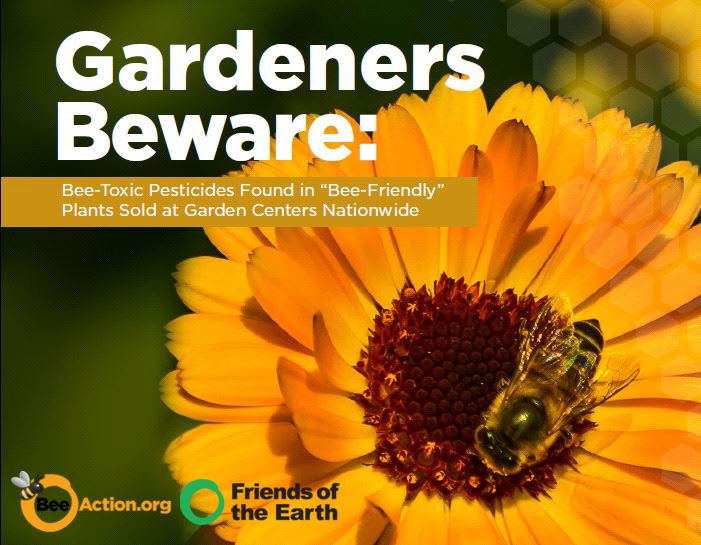This summer flew by without so much as a bee sting. Where were the bees? Usually we find a hive or two above our garage or hidden in the shingles of our house. Nothing this year. It may have been a coincidence or maybe it’s because the bees are in trouble.
Honeybees pollinate many of our crops (apples, cucumbers, watermelon and more) and are responsible for 1 in every 3 mouthfuls of food we eat everyday. But the bees are dying off as their hives suffer from Colony Collapse Disorder (CCD).
There’s a reason to be concerned: if the bees die so do we.
Why are the bees dying?
Pesticides. There’s that dreaded word again. It won’t go away and it’s the cause of so many of our woes.
There’s a new class of pesticides called neonicotinoids and they’re killing bees.
New report shows common garden plants could be killing bees
A new report by Friends of the Earth-US and Pesticide Research Institute found 54 percent of common garden plants bought from top retailers including Lowes and Home Depot contained neonicotinoid pesticides, which studies show can harm or kill bees and other pollinators. Here’s another kicker: there’s no warning label on the plants.
How ironic- we’ve been working so hard to claim our little piece of land to grow an organic garden, but the starter plants we’ve been using could contain pesticides that are leeching into the water supply, and growing into the leaves and flowers of the plant which can harm bees, butterflies, ladybugs, earthworms, even birds. Ultimately these toxic pesticides probably make their way into the food we’re eating.
What’s more infuriating is that in April, 2013, Europe banned this class of pesticides, but here in the US they’re still fair game.
So now that you know the scoop here’s what you can do to help save the bees
- Send a letter to the CEOs of Home Depot and Lowe’s asking them to stop selling bee-killing pesticides.
- Tell Congress to stand up for bees and support the Save America’s Pollinators Act.
- Plant native flowers and plants around your home which will provide bees with the food they need to continue pollinating.
- Grow bee-safe: Purchase organic plant starts or grow your plants from untreated seeds in organic potting soil for your home vegetable and flower gardens.
- Avoid the use of systemic bee-toxic pesticides in your garden and use alternative approaches such as providing habitat to attract beneficial insects that prey on pest insects in your garden.
- Don’t buy products that contain neonicotinoids: Read the label and avoid using off-the-shelf neonicotinoid insecticides in your garden. These products contain acetamiprid, clothianidin, imidacloprid, and thiamethoxam as active ingredients.
- See if you have these products at home, dispose of them properly or take them back to the store where you bought them.
Let me know if you have any other suggestions to protect bees.
This post is part of the Get The Buzz On Bees And Make Your Backyard Count – Blog Fest 2013.

